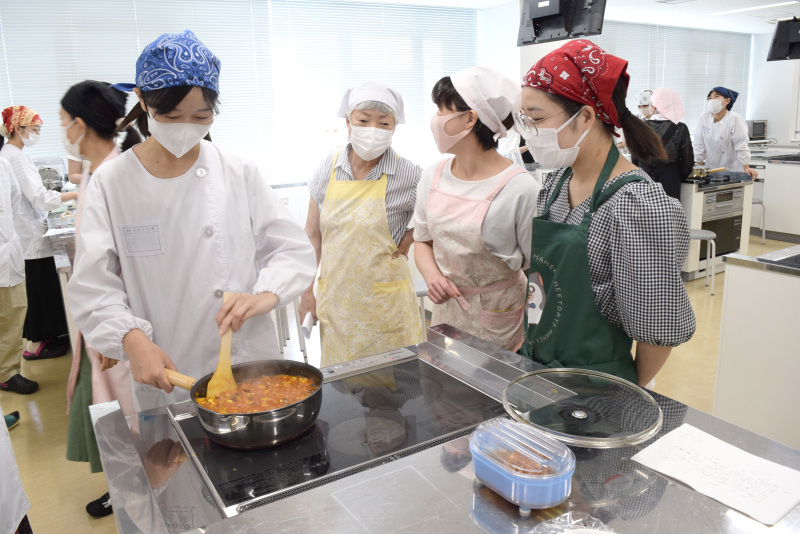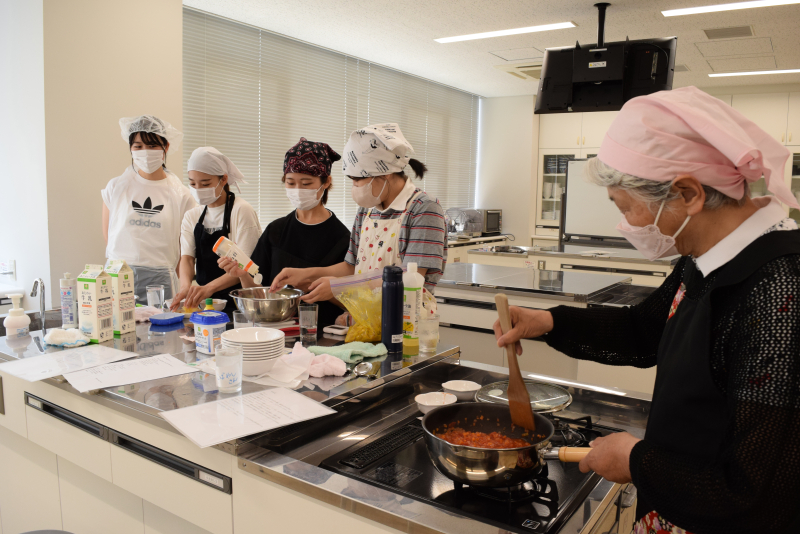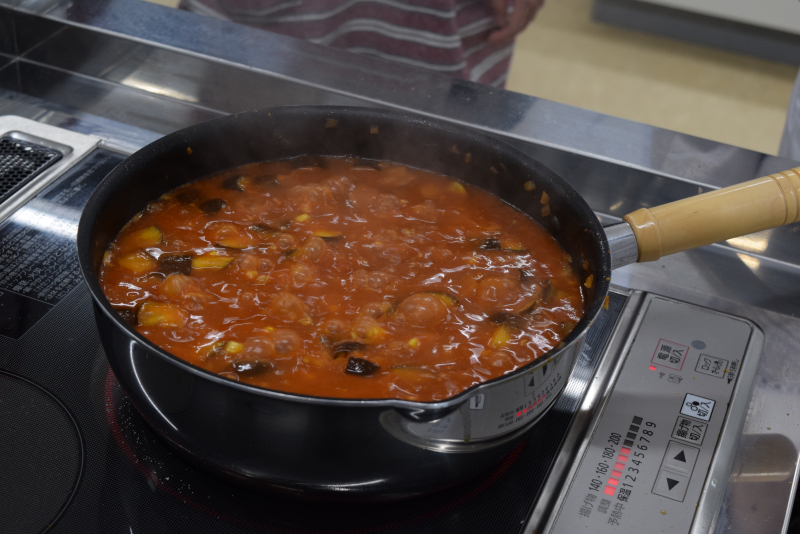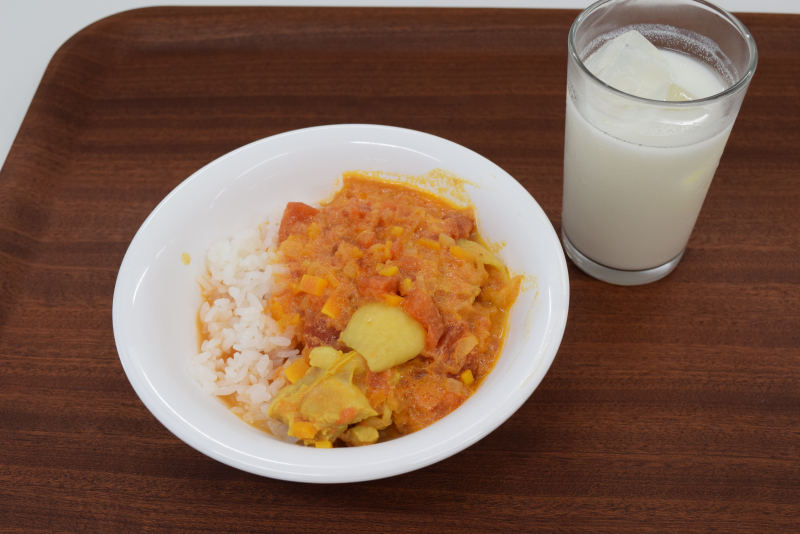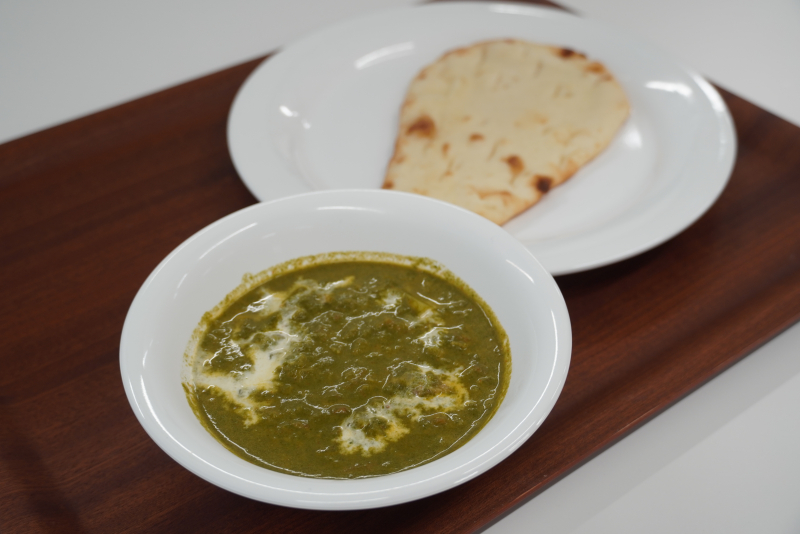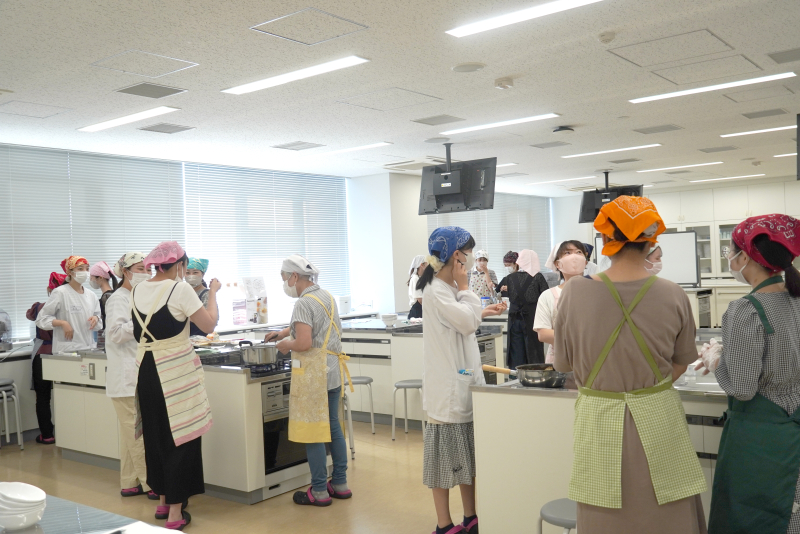学生が考案したスパイスカレーを子ども食堂のスタッフと一緒に調理しました。
2023/07/26
English below.
尼崎市の子ども食堂で活動する日本語日本文学科、教育学科、食物栄養学科の合同ゼミが7月25日に学校教育館で子ども食堂のスタッフとスパイスカレー作りに取り組みました。
子どもたちに放課後の居場所と食事を提供する子ども食堂。本学では2018年から尼崎市元浜町の子ども食堂「モコモコ俱楽部」の運営をサポートしています。
今年度、学生たちは子ども食堂がある尼崎市に外国にルーツを持つ人が多数居住し、スパイスカレーの店が多いことに着目。子どもたちに多様な文化に興味を持ってもらおうとオリジナルのスパイスカレー作りを企画しました。学生はカレー店に取材を申し込み、カレーの作り方のポイントや使っているスパイスなどについて取材。子どもたちにどのようなカレーを提供したいのかを話し合い、食物栄養科学部の学生が食材や分量などの調整を行い、レシピを考案しました。
この日はゼミ生22人が3グループに分かれて「ほうれん草カレー」、「ナスとトマトのキーマカレー」、「辛くない!リンゴ入りチキンカレー」の3種類のスパイスカレーを作り、試食しました。試食後、学生がアプリで投票を行い、「ナスとトマトのキーマカレー」が1位になりました。子ども食堂「モコモコ俱楽部」では学生たちのレシピを参考に子どもたちにカレーを提供する予定です。また、学生たちは今後、取材したカレー店を紹介するマップ作りなどに取り組みます。
カレー作りに携わった日本語日本文学科3年の高橋明里さんは「他の学部ではあまりない合同ゼミで色々な人と関わって様々な経験を積むことができて楽しいです。コロナで調理実習もすることができなかったので、この機会にできて嬉しかった」と話しました。
また、食物栄養学科4年の佐々木香穂さんは「子どもたちには食文化の違いを感じながらカレーを味わってほしいです」と思いを語りました。
「辛くないりんご入りチキンカレー」を学生と一緒に調理した子ども食堂「モコモコ倶楽部」代表の小林三枝子さんは「子どもたちはカレーが大好きですが、私達が作るとつい同じような味になりがち。学生が考えた鶏肉やほうれん草を使ったちょっと珍しいカレーは子どもたちも喜ぶと思います。コロナが落ち着いて子ども食堂の利用は増えており、学生さんたちのサポートに助けられています」と話しています。
A joint seminar of the Department of Japanese Language and Literature, the Department of Education and the Department of Food Sciences and Nutrition, which works at a children's canteen in Amagasaki, worked with the staff of the children's canteen to make spiced curry at the School Education Building on 25th of July.
The children's cafeteria provides children with a place to stay and eat after school. Since 2018, the University has supported the operation of the children's cafeteria "Mokomoko Club" in Motohama-cho, Amagasaki City.
This year, the students focused on the fact that many people with foreign origins live in Amagasaki City, where the children's cafeteria is located, and that there are many spiced curry restaurants. In order to get children interested in different cultures, they planned to make their own original spiced curry. The students arranged interviews with the curry shops to find out about the process of making the curry and the spices they use. They discussed what kind of curry they wanted to serve to the children, and adjusted the ingredients and quantities and devised a recipe.
On the day of, 22 seminar students were divided into three groups to prepare 'Spinach Curry', 'Keema Curry with Eggplant and Tomato' and 'Non Spicy Chicken Curry with Apples', and tasted the three spiced curries. After the tasting, the students voted using the app, and the eggplant and tomato keema curry came out on top. The children's canteen Mokomoko Club plans to serve curry to children using the students' recipes. The students will also work on creating a map to introduce the curry restaurants they covered in the future.
Akari Takahashi, a third-year student in the Department of Japanese Language and Literature, who was involved in making the curry, says: "I enjoy being involved with a wide range of people and gaining experiences in this joint seminar, which is not often the case in other faculties. Opportunities were limited during the pandemic, so I was pleased to have the chance to participate."
Kaho Sasaki, a fourth-year student at the Department of Food and Nutrition, also shared her thoughts: 'I want the children to taste curry while learning about the cultural differences in the food we eat."
Mieko Kobayashi, representative of the children's cafeteria Mokomoko Club, who cooked the 'Non-spicy Chicken Curry with Apples' with the students, said: "Children love curry, but when we cook it, it tends to taste the same. I think children will be pleased with the slightly unusual curry using chicken and spinach that the students came up with. The use of the children's cafeteria has increased since the pandemic, and we are grateful for the support of the students of Mukogawa Women's University".

